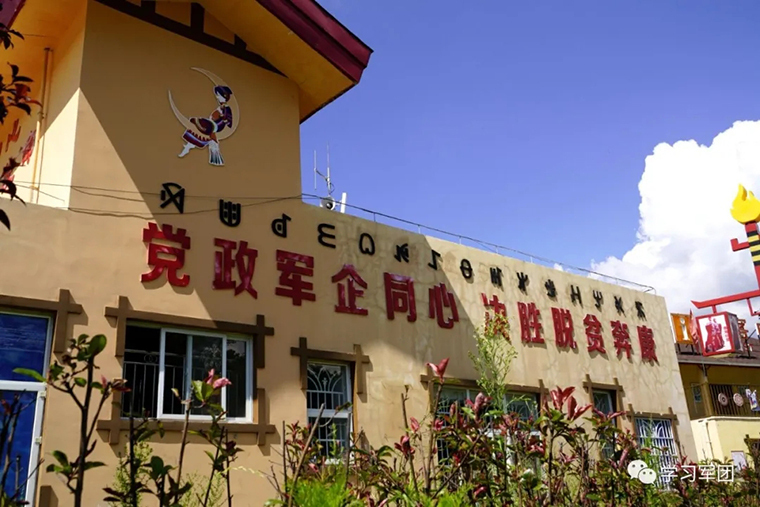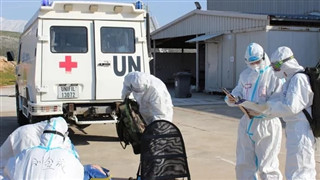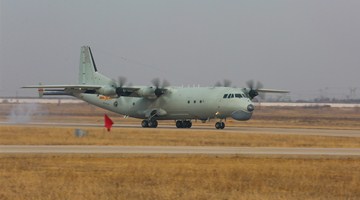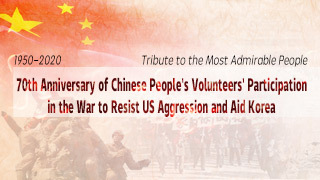By An Puzhong and Huang Xianwen
Editor's Note: This is one of the heartwarming stories from China in this new era. Since the 18th National Congress of the Communist Party of China (CPC), President Xi Jinping, who cares for the ordinary people, has visited poverty-stricken regions many times to bring solutions to the challenges and obstacles hindering poverty reduction. The People’s Liberation Army (PLA) has considered its participation in poverty alleviation a concrete move to translate its loyalty to the Party into practical actions. With a strong sense of mission, the whole army is fulfilling its commitment to share the Party’s burdens and strive for the great rejuvenation of the Chinese nation and the benefit of the people.
[Playback] On February 11, 2018, after a four-hour drive along a zigzagging road on the steep hillside, President Xi Jinping arrived at Sanhe Village of Sanchahe Township and Huopu Village of Jiefang Township , both hidden deep in the Daliang Mountains in Zhaojue County , to visit local poor people. During the visit, President Xi pointed out that relocation is an effective way to achieve targeted poverty alleviation, which should be implemented well. Relocation of the poor should be combined with industrial development and reemployment, so that relocated people could settle down, get employed and achieve development.

The picture shows the kindergarten of Jiemeng Xinzhai. The Yihai Village in Mianning County, the Liangshan Yi Autonomous Prefecture, Sichuan Province in southwest China, which is also called Jiemeng Xinzhai (literally, “Alliance-Signing New Village”) has got rid of poverty with the targeted pairing-assistance of the PLA Strategic Support Force (PLASSF) starting from October 2016. (PLA Daily/Liu Keyue)
Setting out from Xichang, the capital city of the Liangshan Yi Autonomous Prefecture, we drove to Yihai Village, Mianning County, which enjoys paired assistance from the PLASSF. The new village impressed us at first sight: Rows of newly built tile-roofed houses with a distinctive Yi ethnic style were scattered on the hillside.
Liangshan is one of the biggest focus contiguous poor area in China, where most of the local poor people lived in shabby and ranch wooden board cottages, and cottages with thatched roof or stone slate roof . Tucked away in the Daliang Mountains, Yihai Village suffered a harsh natural environment and backward development. For decades, locals led a difficult life.
Today, the Yihai Village has seen tremendous changes. The reporters recently visited the village to explore the stories behind its rise.
Not a Single Ethnic Group, Family Should Be Left behind on the Road toward a Moderately Prosperous Society in All Respects
Yihai is also called Jiemeng Xinzhai (literally, “Alliance-Signing New Village”). The name is derived from the story of “the Red army allying with the Yi people in Yihai.” In May 1935, the contingent of the Central Red Army , led by Commander Liu Bocheng and Political Commissar Nie Rongzhen, arrived at the Yi ethnic minority area in the Daliang Mountains. Liu Bocheng and Xiaoyedan, chief of the Guoji tribe of the Yi ethnic group, took the blood oath to sign a brotherhood alliance. The Red Army smoothly passed through the Yi area, leaving a story of national solidarity in China’s modern history.
Over decades, stories of the Red Army have been continuously told in Yihai Village: During the Long March, though exhausted, officers and soldiers of a Red Army detachment passing the village would rather sleep under a tree than disturbing local Yi inhabitants. Before departure from the village, they helped villagers to tap a water spring that has benefited generations of people.
Ma Qiang, a veteran and Party chief of Yihai Village, told the reporter: “The CPC Central Committee and President Xi care poor people in the Daliang Mountains very much. When visiting poor local households, President Xi stressed that no single ethnic group and family should be left behind on the road toward a moderately prosperous society in all respects.”
During the Two Sessions in 2017, President Xi particularly met with delegates from the Liangshan Yi Autonomous Prefecture to learn about the progress of poverty alleviation there. He said that he had visited most of the contiguous areas of dire poverty in China and would visit Lyuliang in Shanxi Province and Liangshan in Sichuan Province that he had yet to visit as soon as possible. We were deeply moved by his words and were full of expectations. But we never expected that the day would come so soon. Before the 2018 Spring Festival, President Xi went to the Daliang Mountains during his inspection tour in Sichuan Province. He visited local low-income families, and sitting by a fireplace, he discussed together with villagers and poverty alleviation work team members on targeted measures to eliminate poverty, recalled Jike Axia , the leader of the poverty alleviation work team in Yihai Village.
In October 2016, the PLASSF signed a new “alliance” with Yihai Village to help villagers get out of poverty and lead a happy life.
Thanks to the PLA Strategic Support Force (PLASSF) , Yihai Village in Mianning County, the Liangshan Yi Autonomous Prefecture, Sichuan Province in southwest China, has taken a totally new look.
Over more than four years, the PLASSF invested a total of RMB 13.5 million yuan in infrastructure construction of Yihai Village including the office building of the villagers’ committee, houses for poor families, a clinic, a kindergarten, a farmers’ night school, and an industrial park, giving the village a totally new look. Yihai Village has risen into a popular spot of Red tourism in Mianning County. In 2019, Yihai became a National 4A Scenic Area, and the development of tourism boosted the employment of local villagers.
Enable Relocated People to Ssettle down, Get Employed and Achieve Development
Jiemeng Farm is a rural restaurant with a strong Yi flavor. It features clean, neat booths separated by walls made of logs. Seeing the reporters, its owners Jike Mosa and Ejue Jiajiamo stopped what they were doing and told us their happy lives.
“In the past, though we didn’t need to worry about food and clothing, our family had almost zero savings and lived in a thatched cottage laid with the earth. Without the assistance from the government and the military, we would never have such a decent residence,” said Jike Mosa, with a happy smile on his face.
“After the completion of Jiemeng Xinzhai, more and more tourists have come to visit our village. Our rural restaurant can earn more than RMB 100,000 yuan a year,” Ejue Jiajiamo, hostess of the restaurant said. “The CPC and the PLA have never forgotten the Yi people.”
President Xi has always kept in mind the livelihoods of the poor. In 2018, he visited low-income families in the Daliang Mountains. There, he visited Sanhe Village that would be relocated and Huopu Village that had just finished relocation.
At the home of Jidi Erzi , a villager in Huopu, President Xi inspected the house carefully. In the sitting room, a firewood-fired heating furnace replaced the former open fire pit that often caused smoke filling in the house. “Renovation has made it totally different,” smiled Xi.
Moving into the new house is just the first step; They also need to really settle down. During the inspection tour, President Xi stressed that relocation of the poor should be combined with industrial development and reemployment, so that relocated people could settle down, get employed and achieve development.
Moving into their new residences is just the start of their new lives. Whenmaking the construction plan for the Jiemeng Xinzhai, the The PLASSF already took into account the village’s sustainable development, supplementary tourism facilities, and specialized industries so that villagers could find ways to increase their incomes after moving in.
The Jiemeng Xinzhai has gradually become a hot tourist attraction. Many local families saw their incomes increasing rapidly by running rural restaurants and hotels and selling local specialties.
At the home of villager Ashuo Wage , the spacious, brightly-lit sitting room is furnished with household appliances and furniture like sofa, tea table, and TV set. On the wall are hung two family photos taken in different periods.
“This photo was taken in front of our new house in Jiemeng Xinzhai, and that one was taken in front of our former earth house,” Ashuo Wage told the reporters while holding her grandson in arms. “It is the Party’s favorable policies and the army’s assistance that make our lives get better and better.”
Years ago, Ashuo Wage’s husband , Jigen Wusa , got a severe illness and has since been confined to bed. The family was trapped in poverty.
“We have moved into a spacious, beautiful new house in the Jiemeng Xinzhai constructed by the government and the army. My son attended a night school built by the army. With the skills he learned there, he now works elsewhere. My daughter-in-law works as a janitor in the Yihai scenic area. Our farming land has been rented to the village’s pepper industrial park,” said Ashuo Wage, laughing with happiness.
“Kashasha (Thank you), the CPC! Kashasha, the PLA!” Jigen Wusa doesn’t speak mandarin fluently, so he gave a thumbs-up to express his gratitude.











